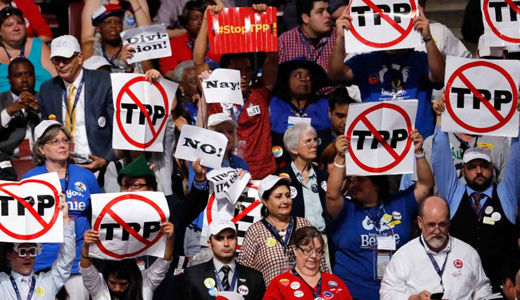
WARREN, Mich. (PAI) – Adding another specific to her economic platform, Democratic presidential nominee Hillary Rodham Clinton told a crowd of workers in Warren, Mich. Thursday August 11 that she would appoint a special “chief trade prosecutor” to pursue foreign violators of trade pacts.
She also reiterated her opposition to the Trans-Pacific Partnership (TPP), the controversial so-called “free trade” pact backed by business, the right wing, the Republicans and her former boss, President Barack Obama. The TPP is currently pending in Congress.
The TPP, Clinton told the crowd in Warren, is like other deals that take advantage of U.S. workers. Such trade pacts don’t live up to their advocates’ promises, she said. She vowed to oppose all of them. “My answer is to make trade work for us and not against us,” Clinton declared. “So my message to every worker in Michigan and across America is this: I will stop any trade deal that kills jobs or holds down wages, including the Trans-Pacific Partnership.
“I oppose it now, I will oppose it after the election and as president.”
Trade, and how it hurts U.S. workers, is a key issue for union members, especially in the industrial Midwest. Past trade pacts, starting with the 22-year-old NAFTA – the U.S.-Canada-Mexico “free trade” treaty – have cost hundreds of thousands of well-paying U.S. factory jobs.
And while GOP President George H.W. Bush negotiated NAFTA, Clinton’s then-president husband, Bill, pushed it through Congress over outspoken and strong worker and union opposition. And as Obama’s Secretary of State, Clinton supported the TPP. GOP nominee Donald Trump used that backing against her in his own Michigan economic speech, in Detroit three days before. He said that she would flip-flop again.
Clinton’s speech in Warren, still home to many auto workers, auto parts workers, and their families, was split between detailing her own economic vision and criticizing Trump. The business mogul is dead set against the TPP, and uses that issue to appeal to blue-collar workers who have lost their jobs to unfair trade deals negotiated and backed by presidents and Congresses of both parties.
Trump repeated his anti-trade pact stand in his Detroit speech. “Just imagine how many more automobile jobs will be lost if the TPP is actually approved. That is why I have announced we will withdraw from the deal before that can ever happen,” he declared.
But Trump also called for reducing the corporate tax rate to 15 percent, while retaining three rates – two of them higher than that – for individuals. And he used coded language to support sending public taxpayer money to private schools and away from public schools and teachers. His tax plan led Clinton to point out the greatest beneficiaries would be the rich, including Trump himself.
She leveled that same pro-rich criticism at Trump’s child care plan. Trump said he’d propose letting parents “fully deduct the average cost of child care spending from their taxes.” Deductions benefit high-income earners by reducing their income, but do little or nothing for others. Tax credits help lower- and middle-income people more.
Putting it all together, “There is a myth out there that he’ll stick it to the rich and powerful because somehow, at heart, he’s really on the side of the little guy,” Clinton said of Trump. “Don’t believe it.”
Unions and their allies have spent time and effort trying to convince blue-collar workers that Trump would hurt them, and they cite his own anti-worker stands and words and his use of past trade pacts to import Trump brand products made in overseas sweatshops.
Clinton also took those swipes at Trump, while pushing her own economic ideas as a contrast. In Warren, she reiterated her proposal for a 5-year $275 billion plan to rebuild U.S. roads, bridges, railroads, airports, and other infrastructure.
And the previous day, in a speech in Des Moines, Iowa – like Michigan, a Midwestern swing state – Clinton bluntly favored unions and their workers as key to that infrastructure plan.
Infrastructure erection and revitalizing U.S. manufacturing would create the largest U.S. jobs program since World War II, she told the crowd at Lincoln High School. “How are we going to do that? Well, we’re going to invest in infrastructure. These are good jobs and a lot of them are good union jobs with good pay and good benefits. See, I have this old-fashioned idea that the middle class of America is what makes America’s economy work.”
Photo: Delegates hold up anti-TPP signs during the Democratic National Convention last month in Philadelphia. J. Scott Applewhite | AP












Comments